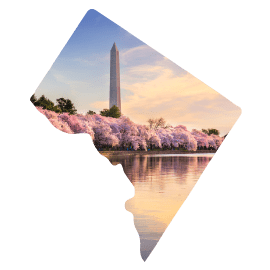Academic Requirements: District of Columbia
Early Childhood Preparation Policy
Analysis of District of Columbia's policies
Academic Requirements:
The District of Columbia requires early childhood education candidates to earn a bachelor's degree and requires proof of enrollment in but not completion of an early childhood education preparation program.
Recommendations for District of Columbia
Require preschool teaching candidates to complete a content specialization in early childhood education or otherwise demonstrate competence in this area.
The District of Columbia should require that preschool teachers have a specialization in early childhood or demonstrate that they have the knowledge needed to teach preschool-age children. Narrowly targeting a candidate's preparation to the early childhood grades is more likely to provide the specific content knowledge and skills needed by preschool teachers, including emergent literacy, oral language, and developmental stages of children birth through age eight.
State response to our analysis
The District of Columbia stated that in addition to the bachelor's degree requirement, it requires early childhood education candidates to earn passing scores on Praxis I Core series basic skills and Praxis II early childhood content knowledge exam that covers pre-K through grade 3. The Principles of Learning and Teaching grade level pedagogy exam is required before obtaining full standard credentialing.
Updated: December 2017
Select another topic
General Teacher Preparation
- Program Entry
- Teacher Shortages and Surpluses
- Program Performance Measures
- Program Reporting Requirements
- Student Teaching/Clinical Practice
- Teaching Methods
Elementary Teacher Preparation
Secondary Teacher Preparation
- Middle School Content Knowledge
- Middle School Licensure Deficiencies
- Adolescent Literacy
- Secondary Content Knowledge
- Secondary Licensure Deficiencies
Special Education Teacher Preparation
Alternate Routes
Hiring
- Requirements for Out-of-State Teachers
- Provisional and Emergency Licensure
- Licensure for Substitute Teachers
- Supporting New Teachers
Teacher and Principal Evaluation
Teacher Compensation
Retaining Effective Teachers
Early Childhood Preparation
Research rationale
The available research finds mixed results on whether having at least a bachelor's degree makes preschool teachers more effective.[1] However, these conflicting results may be more indicative of the fact that current training programs that certify teachers to teach preschool (and often cover a wide span of elementary grades as well) pay too little attention to the requirements for teaching preschool. Despite the inconclusive research, the National Academies of Sciences, the National Institute for Early Education Research, and a number of other organizations support requiring at least a bachelor's degree for preschool teachers for several reasons.[2] These reasons include that teaching preschool should be considered a career as important and complex as teaching K-12 classes, and so this role is deserving of the same educational requirements; this degree requirement would create greater consistency between the preschool and K-12 workforces; and preschool teachers would benefit from a foundation in liberal arts coursework that gives them a firm grounding in a range of content that they will teach, much like what elementary teachers need.
However, to make a training program meaningful, it needs to be narrowly targeted to the early childhood grades. As the grade span of a teaching certification broadens, training programs are less likely to provide the specific emergent literacy and oral language skills that preschool teachers need. [3] To support this focus and to make training for teachers more meaningful, the state should require that preschool teachers have a specialization in early childhood (rather than, for example, a bachelor's degree in K-6 teaching), or can demonstrate that they have the knowledge needed to teach early childhood.
[1] For example, research in support of requiring at least a bachelor's degree concluded that "the education levels of preschool teachers and specialized training in early childhood education predict teaching quality and children's learning and development." See: Barnett, W.S. (2003). Better teachers, better preschools: Student achievement linked to teacher qualifications. Preschool Policy Matters, 2, 1-12; In contrast, a 2007 review of seven preschool studies found contradictory relationships between teachers' level of education and child outcomes. See: Early, D. M., Maxwell, K. L., Burchinal, M., Alva, S., Bender, R. H., Bryant, D., ... & Zill, N. (2007). Teachers' education, classroom quality, and young children's academic skills: Results from seven studies of preschool programs. Child Development, 78(2), 558-580. Other research has found moderate differences in the instructional content of teacher preparation programs at different degree levels. See: Buettner, C. K., Hur, E. H., Jeon, L., & Andrews, D. W. (2016). What are we teaching the teachers? Child development curricula in U.S. higher education. Child & Youth Care Forum, 45(1), 155-175; Maxwell, K. L., Lim, C-I., & Early, D. M. (2006). Early childhood teacher preparation programs in the United States: National report. Chapel Hill, NC: University of North Carolina, FPG Child Development Institute. Retrieved from http://fpg.unc.edu/node/5247; Bornfreund, L. A. (2011). Getting in sync: Revamping licensing and preparation for teachers in pre-k, kindergarten, and the early grades. Washington, DC: The New America Foundation. Retrieved from http://fcd-us.org/resources/getting-sync-revamping-preparation-teacherspre-k-kindergarten-and-early-grades; Whitebook, M., & Austin, L. J. E. (2015). Early childhood higher education: Taking stock across the states. Berkeley, CA: Center for the Study of Child Care Employment, Institute of Research on Labor and Employment, University of California. Retrieved from http://www.irle.berkeley.edu/cscce/wp-content/uploads/2015/11/Cross-state-Brief-Final.pdf
[2] Institute of Medicine, National Research Council. (2015). Transforming the workforce for children birth through age 8: A unifying foundation. Washington, DC: The National Academies Press. Retrieved from http://www.nap.edu/catalog/19401/transforming-the-workforce-for-children-birth-through-age-8-a; Barnett, W. S., Carolan, M. E., Squires, J. H., Clarke Brown, K., & Horowitz, M. (2015). The state of preschool 2015: State preschool yearbook. New Brunswick, NJ: National Institute for Early Education Research.
[3] Putman, H., Moorer, A., & Walsh, K. (2016). Some assembly required: Piecing together the preparation preschool teachers need. Washington, DC: National Council on Teacher Quality. Retrieved from: http://www.nctq.org/dmsStage/Preschool

